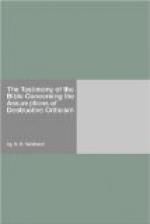We turn now to the assumption that Moses was not the author, under God, of the Pentateuch. The destructive critics do not agree among themselves as to the origin of the Pentateuch. Dates and authors are variously adjusted among those claiming to be experts. There is, however, agreement on one point, that Moses did not write the Pentateuch. It is affirmed that his name has been attached to it to give it authority, because many of the events recorded and much of the history took place during the period of Moses’ life and in connection with his influence. But the critics place the record of those events almost altogether after the exile, between nine hundred and a thousand years after the time of Moses.
It was once affirmed that writing was not used in the days of Moses, and therefore he could not have written the five books that claim him as their author. But the fact now brought to light, and conceded by the critics and all well-informed scholars, that writing antedated Moses by many centuries, has swept out of existence that objection. But the question is still raised as to the Mosiac authorship of the Pentateuch. It is said in reply:
First—The Holy Spirit declares by the mouth of Stephen that “Moses was learned in all the wisdom of the Egyptians, and was mighty in words and deeds.” Acts vii. 22.
Writing was long known to and practiced by the Egyptians, hence the man trained in all the wisdom of the Egyptians was competent to write the Pentateuch.
Second—The Pentateuch very definitely claims Moses as its author, not once or twice, but many times, all through these writings.
“The Lord said unto Moses, Write this for a memorial in a book, and rehearse it in the ears of Joshua, for I will utterly put out the remembrance of Amalek from under heaven.” Exod. xvii. 14. This was not the law, parts of which even some of the critics concede that Moses wrote. It was God’s judgment against Amalek. But it was written in a book. What book? The inspired Scriptures say it was written here in Exodus xvii. 14. And again it was repeated in Deut. xxv. 19, and that Moses wrote it.
In the twenty-fourth chapter of Exodus Moses has given an account of God’s call to him, to Aaron, Nadab, Abihu, and the seventy elders, to come up to Horeb. Moses was called into the immediate presence of God, while the others remained at a distance. After his interview with Jehovah it is written: “Moses came and told the people all the words of the Lord.... And Moses wrote all the words of the Lord.” Exod. xxiv, 3, 4.
In the thirty-fourth chapter of Exodus God is represented as giving definite instructions to Moses concerning worship, at the conclusion of which “the Lord said unto Moses, Write thou these words, for after the tenor of these words I have made a covenant with thee and with Israel.” Exod. xxxiv. 27.




